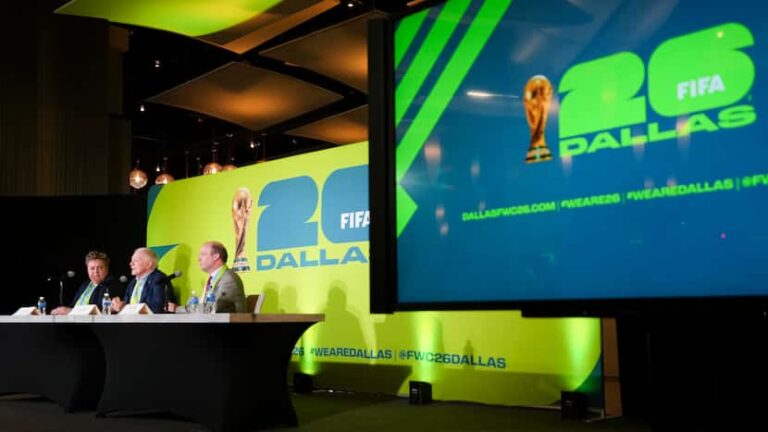The city of Dallas has already begun preparing for how the 2026 World Cup will reshape North Texas over the next two years with nine games and thousands of international fans in the region. Some of the city's leaders met with the Dallas Sports Commission on Tuesday to discuss what the World Cup will mean for D-FW financially and what the next steps are.
AT&T Stadium in Arlington will host nine games, more than any other host city, and is poised to have a huge financial impact on North Texas. Monica Paul, executive director of the Dallas Sports Commission, has been a key captain in North Texas' push to host the World Cup.
Although Arlington didn't make the finals, D-FW still has a chance to make the region a World Cup hub. Because Dallas is located in the middle of the United States, Paul said it has a unique opportunity to be the epicenter of the World Cup in the United States.
“Thanks to our central location and airport, some commercial companies may find it easier to work here than in other cities for long periods of time,” she said during the meeting. Ta. “They could really make this a hub location.”
When North Texas began planning for the World Cup in 2017, it was expected there would be only four games. These four games were expected to bring in more than $400 million to the region. But the additional five games will send Paul and the Dallas Sports Commission back to the drawing board to determine the expected financial impact, she said.
This summer and fall, the Dallas Sports Commission is expected to release a new, more detailed economic impact report.
Attracting and retaining fans in Dallas
Dallas is considering hosting an International Broadcast Center, a temporary venue for radio and broadcast stations where live feeds of games would be monitored.
“FIFA hasn't made a decision yet, but Dallas is a finalist for the International Broadcast Center, which will be held at the Kay Bailey Hutchinson Center. That's a huge opportunity,” Paul said.
If Dallas is chosen, the International Broadcast Center would bring 10,000 media members to the area for six months, staying a total of 172,000 nights in local hotels, Paul said. However, the hotels where the media, players and referees will stay have not yet been decided.
But the benefits of the International Broadcasting Center extend beyond the hotel, Paul said.
“The other big advantage is that if we secure that, we can be front and center. All the journalists and broadcasters are here,” she said. “This is a great opportunity for them to share all the things they can do here, all the charm here and all the reasons we all love living here.”
Other prominent Texas organizations will also need to play important roles in the smooth running of the World Cup.
Toyota Stadium in Frisco, Dallas Baptist University, Texas Christian University and the University of Dallas will all serve as base training camps for the team. After team selections are announced, the Dallas Sports Commission will consider targeting which teams have the potential to draw more visitors to the area, Paul said.
Teams that play at AT&T Stadium use the Cotton Bowl and Southern Methodist University as practice venues.
FIFA's Fan Festival, a venue where fans can gather in public to support their favorite teams, is held at Fair Park. However, Klyde Warren Park, Southern Gateway Park, Arlington Entertainment District, and Sundance Square may also be used for preparations leading up to and during the World Cup.
“It’s like an onion that’s still being peeled a little bit,” Paul said. “I think there are some additional opportunities, but we have to get through the next few months and continue to work with FIFA.”
What's next?
Dallas is still subject to the vagaries of FIFA's decisions, but the hard work for Paul and the city is just beginning. The next steps for the Dallas Sports Commission will be to find volunteers, address issues such as transportation, and work with the state government to raise funds.
“There are some deadlines in negotiations with FIFA. But we are working on an event test model this summer with Copa America and several other events, and we are working on an event test model for the transportation system, not just the AT&T Stadium one. We will also test the fragments,” she said.
This is an opportunity for the city of Dallas, and the city is determined not to let it pass, said Craig Davis, president and CEO of Visit Dallas.
“People know the Dallas name, but they don't know who we are,” he said. “The economic impact will be amazing in a good way. There will be a lot of great things left behind, including legacy projects. Maybe this will be the moment we transcend.”

